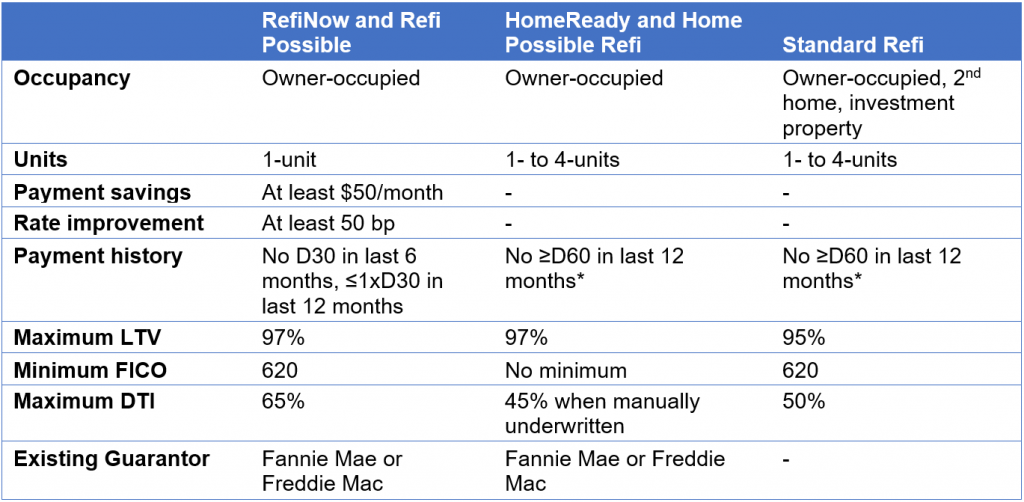


That lender can do an informal credit check from a single bureau that won't affect your credit score, says Randall.

At, for example, you can see up to 28 different FICO scores, including mortgage scores, for $19.95 a month and up.Īnother option is to go to a lender for a mortgage preapproval. You have to pay a fee, though, to get your mortgage credit scores as well as regular updates. “It’s important to do this before you fall in love with a house and make an offer,” says Lucy Randall, director of sales at, an online mortgage provider. Until a new formula is approved by FHFA, however, the old formula remains in use.īefore you start touring open houses, make sure to look up your mortgage score. But that process could take several years, says Gaskin. Last summer the Federal Housing Finance Administration (FHFA), which oversees Fannie Mae and Freddie Mac, announced that it would consider alternative credit scoring formulas.
#FREDDIE MAC PROGRAMS FOR REFINANCE UPDATE#
“It’s kind of sad that the best advice says consumers should shop around to get the best deal, but that shopping could cause you to ding your credit score,” says Lisa Rice, president and CEO of the National Fair Housing Alliance, a nonprofit group.Īccess to credit for home buying has been a longstanding challenge for people in low-income communities, especially consumers of color, says Rice, who sees an urgent need to update the mortgage credit score. That's important because having too many requests for your credit score can actually lower the score a high number of inquiries may indicate you are a riskier customer.īut that window is just 14 days for the mortgage score issued by Experian, one of the three major credit bureaus that generate credit scores. Newer credit formulas give consumers a 45-day shopping window, when multiple credit requests by lenders will count as a single inquiry. You also may have less time to shop for a mortgage without hurting your credit. But these payments are not counted under the old mortgage formula.Īs a result, it’s not surprising to see differences of 20 points between the FICO score used by mortgage lenders and other credit scores, according to Joanne Gaskin, vice president, score and analytics, at FICO. New programs such as Experian Boost and eCredable Lift allow consumers to add payments for utilities and rent to their credit reports, which can help their scores if they have thin or poor credit histories. Mortgage credit scores can also be more difficult to improve. Similarly, debt collections that have been paid off, which are not counted in newer scoring models, can still weigh against consumers under the classic FICO formula, says Chi Chi Wu, a staff attorney at the National Consumer Law Center, a nonprofit group. As a result, the old formula may give some borrowers lower scores, says John Ulzheimer, a credit expert.įor example, medical debt is counted less heavily under newer FICO scores, compared with the mortgage formula.
The problem with the old formula is that it doesn't reflect some of the more consumer-friendly changes that have been introduced in the new formulas for other credit scores. Over the past decade, there have been efforts to revamp the mortgage credit score, but the process has been slowed by Washington bureaucracy. “The problem is consumers often don’t even know that mortgage scores exist and that there may be a big disparity compared with the credit score they commonly see,” says Syed Ejaz, a policy analyst at Consumer Reports. It helps determine whether you qualify for a home loan and what rate you pay. Because a house is usually a family’s biggest financial commitment, the mortgage score is one of the most important. In fact, consumers have dozens of credit scores, many of which they don’t know about and may never see. Many home buyers are just as surprised to find out they have a mortgage credit score-and that it’s often much lower than their primary credit score. “I was never aware of the huge discrepancy between my mortgage score and other credit scores until I was trying to buy a home,” says Moore, 38, a self-employed contractor. It placed her in the good credit range but not high enough for the rate she wanted. That placed her in the very good range, which qualified her for an affordable interest rate.īut during the preapproval process, Moore’s bank said that her mortgage credit score-a number she didn't even know existed-was just 700. When Raquel Moore of Atlanta began shopping for her first home last summer, she thought her credit score was 760 based on the number shown by her credit monitoring service.


 0 kommentar(er)
0 kommentar(er)
